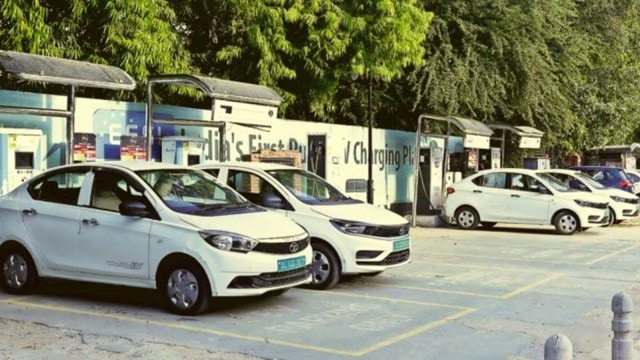The Uttar Pradesh government has indicated to carmakers that the state is unlikely to roll back its decision to waive registration fees for strong hybrid and plug-in hybrid electric vehicles, despite pushback from some companies to rescind the policy, The Indian Express has learnt.
During a meeting with automakers on Sunday (August 11), the Uttar Pradesh Chief Secretary is learnt to have informed carmakers about the decision to not take the policy back. The policy was said to be criticised by major car manufacturers like Tata Motors, Hyundai and Kia, as it was being seen as beneficial to their rivals Maruti Suzuki and Toyota Kirloskar who have a big portfolio of hybrid cars.

“The state government has indicated that they want to encourage both hybrid and electric vehicles and believes there have to be incentives provided to both the classes. There is also an understanding that the incentives need to be dynamic in nature given that the two vehicles have different technologies and are not in the same category,” a source aware of what was discussed at the meeting said on condition of anonymity. Countries everywhere, including India, are pushing toward electrification. In India, Tata Motors, Mahindra & Mahindra and Hyundai Motor have been betting big on pure electric vehicles (EVs). But passenger car market leader Maruti Suzuki has taken a more conservative approach, with no battery EV in the market so far. Maruti has, however, prioritised hybrids in its portfolio in partnership with Toyota Kirloskar.
Maruti Suzuki, Tata Motors and Hyundai Motor India did not respond to an immediate request for comment. In July, the Uttar Pradesh government had waived off registration fees for strong hybrid and plug-in hybrid electric vehicles, joining states like Tamil Nadu and Chandigarh in offering incentives for cleaner alternatives to petrol and diesel vehicles. The move had come as hybrid vehicles seemed to be gaining traction globally by offering improved fuel economy without the range anxiety of pure EVs. Recent sales figures highlight this shift in India’s automotive market. In FY23, strong hybrids made up 0.5 per cent of total sales, which surged to 2.2 per cent in FY24. By comparison, the share of battery EVs grew at a slower pace, from 1.3 per cent to 2.3 per cent of the market, and there are signs of a further slowdown in this category.
The UP government’s 100 percent waiver on registration fees for strong hybrids could save buyers up to Rs 3.5 lakh. The waiver is likely to boost sales for manufacturers like Maruti Suzuki India, Toyota Kirloskar Motor, and Honda Cars India, all of which offer strong hybrid models. Previously, strong hybrids priced above Rs 10 lakh ex-showroom incurred a 10 percent road tax. The state government is said to have clarified to carmakers that the scheme may apply only to hybrid vehicles certified under the central government’s Faster Adoption and Manufacturing of Electric Vehicles (FAME II) programme.
In February last year, the Tamil Nadu government had also announced incentives in the form of road tax, registration, and permit fee exemptions for strong hybrids. The Chandigarh administration also offers road tax rebate on strong hybrid vehicles priced below Rs 20 lakh.
According to HSBC research, hybrid vehicles are the more practical medium-term solution for the country’s decarbonisation efforts and, more importantly, are less polluting.
Story continues below this ad
“We have a long-standing belief that hybrid and compressed natural gas cars are a practical medium-term (5-10 years) solution for India, while the country moves towards eventual electrification. Hybrids are critical not just from a cost of ownership perspective, but also for India’s decarbonisation drive,” HSBC said in a note issued to investors earlier this year.
The note said that total (well-to-wheel, or WTW) carbon emissions from an EV is currently 158 g/km, compared to 133 g/km for hybrids — which means that a hybrid is at least 16% less polluting than the corresponding EV. These numbers are 176 g/km and 201 g/km for corresponding petrol and diesel vehicles respectively.
The shift towards hybrids is not unique to India. Globally, hybrid sales are surging as full EV adoption slows. In the United States, the average time to sell EVs doubled from 34 days in January, 2023 to 72 days in February, 2024. Meanwhile, hybrid EV sales soared by 53 per cent in 2023, reaching a record 1.2 million units. The trend continued in the first three months of 2024, with hybrid sales jumping 45 per cent year-on-year, while EV sales growth decelerated to just 2.7 per cent

































